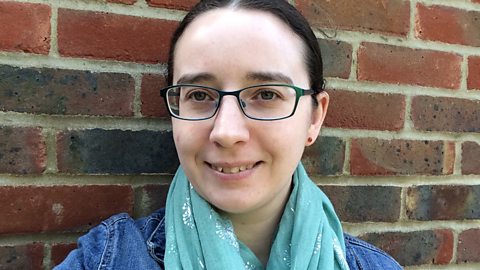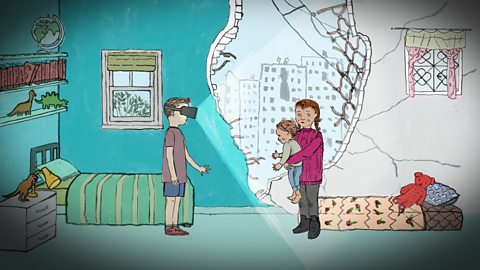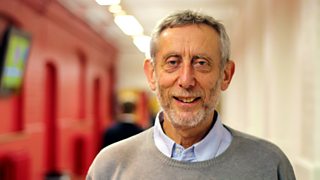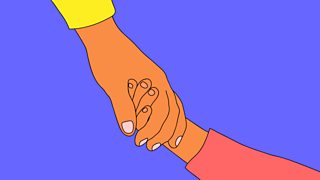What it’s like to learn you’re autistic later in life
Around 1% of the population is thought to be on the autistic spectrum. But despite the fact that it’s a lifelong condition, many people don’t get a diagnosis until they’re in their thirties or even later, especially women.
Writer and performer Helen Keen found out she was autistic as an adult. In Broad Spectrum, she speaks to psychologists and people with autism to find out why diagnosis can take so long, what happens when it’s missed, and how discovering they’re autistic changes people’s lives. Here are a few things we've learned.

-
![]()
Broad Spectrum
Helen Keen explores how autism is diagnosed in adults and how it appears in women.

Why autism is often missed in childhood
Psychiatrists used to think autism was rare among women and non-binary people, but we now know autistic traits can express themselves differently. Professor Francesca Happé, an expert in autism from the Institute of Psychiatry, Psychology and Neuroscience in London, says that historically research has mainly focused on men. This has shaped how autism is understood and diagnosed. It means that “we carry around a male stereotype of autism, so we’re less likely to think about autism when we see a girl struggling socially.”
We carry around a male stereotype of autism, so we’re less likely to think about autism when we see a girl struggling socially.Professor Francesca Happé, Institute of Psychiatry, Psychology and Neuroscience
It’s not only a gender issue. Psychologist Dr Stephen Stagg of Anglia Ruskin University says the low numbers of NHS referrals suggest autism is being under-diagnosed among black and Asian people too. But there’s not yet a lot of research into this.
Eloise is an Oxford psychology graduate. She says that although she felt different to other people, she didn’t link it to autism “because no one had ever explained to me what an autistic woman was like, what it feels like, what it looks like.” It wasn’t until adulthood that she got a diagnosis. “I started my PhD and basically had what I now think was an autistic breakdown, which comes from the world being overwhelming and confusing and not really knowing why. I was really poorly, and I couldn’t function at all... And then, eventually I saw a psychiatrist who said, ‘You’re autistic’. And it just sounded so simple.”

"I was diagnosed with autism when I was 25"
Laura Williams explains how she welcomed the diagnosis and how it has impacted her.
The pressure to keep quiet
Happéalso says that autism “may look a bit different in at least some women and girls”, partly because they tend to ‘mask’ it more than boys. She says that girls who are quiet are often praised for being well-behaved, which can encourage those with autism to hide their autistic traits. “If you just hold yourself in and are very quiet, then you may be able to... disguise the different thoughts and different ways of expressing yourself that would come naturally to you as an autistic girl.”
Catina Burkett is an advocate for women and black autistic excellence in the USA. She says, “If you’re female with autism... you just want to say the truth because it’s how you see it.” But instead, “you’re taught to be quiet. Be nice.” Catina says being a person of colour can increase the pressure to stay silent because “you have the whole thing with your community: ‘Don’t make us look bad… This is not how we behave.’”

The ways women are being forgotten on a daily basis
A range of case studies, stories and new research highlights ways women are ‘forgotten’.
The high cost of camouflaging
People with autism, especially women, often mask or ‘camouflage’ it by imitating how others behave. Happé explains: “We hear from autistic women and girls that they work quite hard to appear neurotypical, or non-autistic, often to avoid bullying or to be more accepted in a rather unfair world.” But this can have a substantial cost. Happésays camouflaging is not only exhausting (she likens it to speaking a language you don’t know very well), it also “seems to erode the sense of self – the sense that you’re presenting your authentic self, and therefore that the people who do love you, the people who are your friends, genuinely are appreciating you.”
People with autism, especially women, often mask or ‘camouflage’ it by imitating how others behave.
Isabel was diagnosed with autism in her early sixties. She didn’t realise she was masking before, but says she now feels much more free. “I’ve been in places, for the first time in my life, where I have felt that I can be myself,” she says. “The field I’m in is performance and, you know, I’m good at it... But I still was not aware that I was performing in my everyday life.”
How undiagnosed autism impacts lives
Dr Stephen Stagg has studied people’s experiences of getting an autism diagnosis after the age of 50. He says those he interviewed had found childhood difficult, struggled to make friends, and grown up feeling like “aliens” because “they just couldn’t work out why the world wasn’t working for them”. As adults, they tended to have had a lot of jobs, and often felt bullied or found it hard to deal with people at work. He says, “I was just surprised at how – to me – how obvious the autism was, and had been throughout their lives, and how it hadn’t been picked up.”
Chuck, who is trans, says their autism should have been recognised. “I’m bitter about the way that adults made me feel the whole time I grew up, just because they didn’t try to think a little bit further.” They say there were clear signs. “I didn’t talk for a really long time. It took me years and years and years and years to learn how to talk. But as soon as I was handed a guitar, within a week I was playing it to a level that you just wouldn’t expect a child to be able to play the guitar.”

The struggle to get driving lessons if you're autistic
People are struggling to find driving instructors who are specialised.
Does a diagnosis really help?
Stagg thinks that for the people in his research, getting an autism diagnosis was “incredibly positive”, because it enabled them to understand their life experiences and “recast their history in a more positive light”. It also meant they could more easily ask for support and adjustments at work that would enable them to succeed in their careers.
For me, the real benefit of the autistic community is not only the peer support, but finding out what gives other people autistic joy.Eloise, Oxford psychology graduate
Carmen is going through the process of getting a diagnosis in her mid-30s. “It’s not essential to get a diagnosis, but it can help with understanding things and also, I guess, feeling empowered when you do need support with something,” she says. Eloise has found that knowing she has autism has helped her use mindfulness to stop camouflaging and be herself. Isabelsays she’s stopped blaming herself for things she can’t do, and begun to embrace who she is. However, Chucksays they don’t need a formal diagnosis to know they’re autistic.
Changing our ideas about autism
Input from autistic people is beginning to change the way autism is researched, assessed and hopefully, valued. Isabel explains that at the moment, the criteria for diagnosis focus on things autistic people struggle with. “It’s quite traumatic because what you’re looking for is examples of negative things, because the whole thing is set up that it has to be the bad side of autism that is used for diagnosis.”
Stagg recalls attending an academic conference where a woman with autism presented a poster listing 20 to 30 skills in which autistic people do better than neurotypical people. “And her point was, these are all hidden within the actual papers that people have written. That wasn’t the story they wanted to tell. They wanted to tell a story of deficits. And there are these areas where people with autism are much, much better at things.”
Eloise has found great support from the autistic community online. She says that “autistic people are wonderful, because every single person has a different special interest… and it’s like having 20 million encyclopedias at your disposal. For me, the real benefit of the autistic community is not only the peer support, but finding out what gives other people autistic joy.”

Can virtual reality help us understand autism?
A new VR experience shows the world from the perspective of an autistic child.
More from Radio 4
-
![]()
Broad Spectrum
Helen Keen had a diagnosis of autism as an adult: she explores how it appears in women.
-
![]()
10 things autistic people want others to know about talking to them
Ten important insights into the challenges autistic people face in social situations.
-
![]()
Word of Mouth: Autism and Communication
Michael Rosen finds out what the rest of society can learn about communication from people on the autism spectrum.
-
![]()
Autism: Nine tips to help parents and children
Advice from Dr Sarah Lister Brook and Emma Gill, who has a young daughter with autism.





